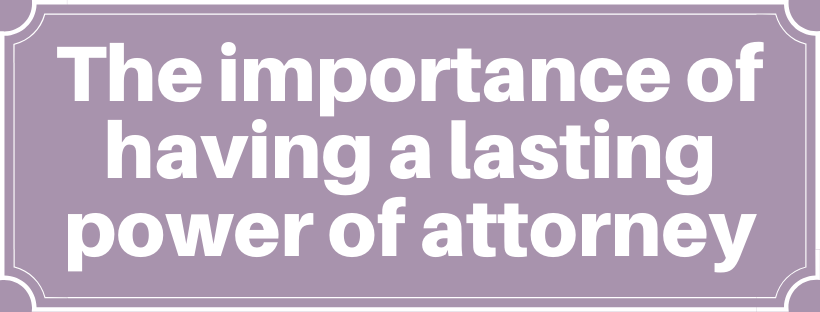- Basildon 01268244144
- Chelmsford 01245453800
- Colchester 01206217300
- London 020 4586 1280

Recent statistics confirm that 82% of people have not yet made lasting powers of attorney (LPA).
An LPA is a legal document that enables you to appoint one or more people as your attorneys. Attorneys are able to assist you in making decisions or can make decisions on your behalf, when you can no longer do so.
Nearly 75% of people believe that family members or partners will be able to automatically make decisions on their behalf when they are no longer able to do so themselves. Also, people believe that as next of kin they can make decisions for an individual. However, an LPA is the only document that gives you the legal ability to give an individual you trust the power to assist you in making decisions.
LPAs are very important legal documents that can be overlooked by many. They are beneficial in that they can allow an individual to plan for the future with an element of reassurance. They can also reduce family conflict knowing that the individual has expressed their wishes regarding their health and who they nominate to look after their finances.
There are two types of lasting powers of attorneys – Health & Welfare and Property & Financial Affairs. An individual can make one or both types but must be over 18 and have mental capacity. LPAs are extremely powerful documents and you should only appoint attorneys you can trust!
What is a Health & Welfare lasting power of attorney?
The Health & Welfare LPA concerns decisions around medical care, whether to move into a care home and the ability to consult with GPs, NHS staff and the Local Authority.
You are able to document your wishes around life sustaining treatment which is of great significance to many as everyone’s views differ.
This LPA only comes into effect when an individual has lost their mental capacity. This means that whilst an individual retains mental capacity, they are able to make decisions for themselves. As mentioned above, although your family may be consulted as a next of kin, they will not have legal authority to make decisions on your behalf without a valid LPA.
What is a Property & Financial Affairs lasting power of attorney?
The Property & Financial Affairs LPA is important for decisions regarding paying bills, managing bank accounts, collecting pensions or benefits and selling your home or property.
This type of LPA can be used as soon as it is registered, even whilst the individual retains mental capacity. This is beneficial as if an individual has an accident or is bed-bound but they still have mental capacity, their attorneys will be able to deal with matters on their behalf.
As the individual making the document, you are able to place restrictions on what your attorneys can do for you, as well as including preferences regarding any decisions made about your health.
There is a common misconception that an LPA is a charter for complete control over another person’s life. The attorneys appointed under the LPA have a duty to help you make as many of your own decisions as you can and to act in your best interests. It is also worth noting that whilst an individual still has mental capacity, they are able to revoke their LPA.
LPAs are not just for the elderly and should be considered by everyone. Younger people may too become incapacitated as a result of illness or accident.
If an LPA has not been made and an individual loses capacity, then a Deputy application must be made to the Court of Protection to enable a third party to deal with your affairs. A Deputy application is costly in terms of both time and money and can result in frustration for family members. Being appointed as a Deputy also comes with additional tasks, such as submitting annual accounts.
Now is the time to protect your family and plan for the future. Make LPAs now whilst you can still choose the people you trust.
At Birkett Long we prepare and register your LPAs with the Office of the Public Guardian to ensure the documents are valid and ready to use when needed. If you would like to discuss making lasting powers of attorney, then please contact one of our specialist wills, trusts and probate lawyers.



Comments